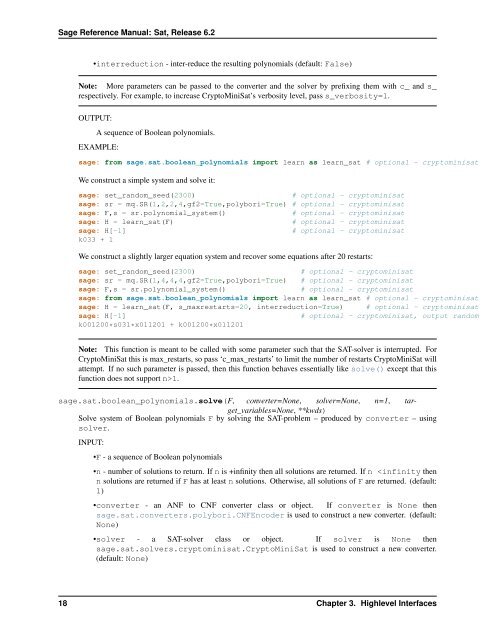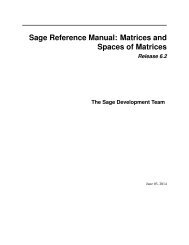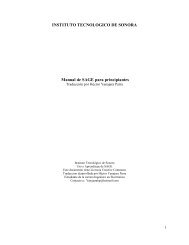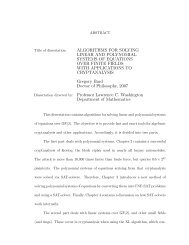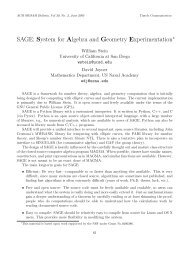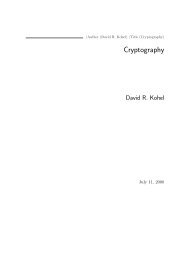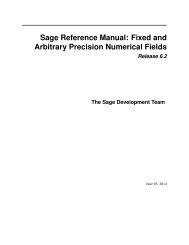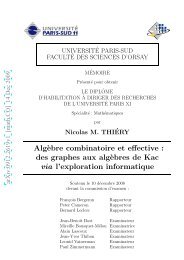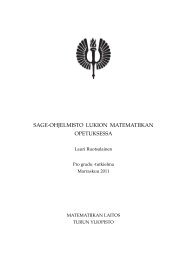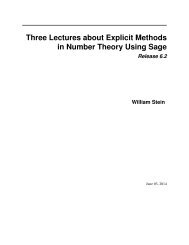SAT solvers - Sage
SAT solvers - Sage
SAT solvers - Sage
Create successful ePaper yourself
Turn your PDF publications into a flip-book with our unique Google optimized e-Paper software.
<strong>Sage</strong> Reference Manual: Sat, Release 6.2<br />
•interreduction - inter-reduce the resulting polynomials (default: False)<br />
Note: More parameters can be passed to the converter and the solver by prefixing them with c_ and s_<br />
respectively. For example, to increase CryptoMiniSat’s verbosity level, pass s_verbosity=1.<br />
OUTPUT:<br />
A sequence of Boolean polynomials.<br />
EXAMPLE:<br />
sage: from sage.sat.boolean_polynomials import learn as learn_sat # optional - cryptominisat<br />
We construct a simple system and solve it:<br />
sage: set_random_seed(2300)<br />
# optional - cryptominisat<br />
sage: sr = mq.SR(1,2,2,4,gf2=True,polybori=True) # optional - cryptominisat<br />
sage: F,s = sr.polynomial_system()<br />
# optional - cryptominisat<br />
sage: H = learn_sat(F)<br />
# optional - cryptominisat<br />
sage: H[-1]<br />
# optional - cryptominisat<br />
k033 + 1<br />
We construct a slightly larger equation system and recover some equations after 20 restarts:<br />
sage: set_random_seed(2300)<br />
# optional - cryptominisat<br />
sage: sr = mq.SR(1,4,4,4,gf2=True,polybori=True) # optional - cryptominisat<br />
sage: F,s = sr.polynomial_system()<br />
# optional - cryptominisat<br />
sage: from sage.sat.boolean_polynomials import learn as learn_sat # optional - cryptominisat<br />
sage: H = learn_sat(F, s_maxrestarts=20, interreduction=True) # optional - cryptominisat<br />
sage: H[-1]<br />
# optional - cryptominisat, output random<br />
k001200*s031*x011201 + k001200*x011201<br />
Note: This function is meant to be called with some parameter such that the <strong>SAT</strong>-solver is interrupted. For<br />
CryptoMiniSat this is max_restarts, so pass ‘c_max_restarts’ to limit the number of restarts CryptoMiniSat will<br />
attempt. If no such parameter is passed, then this function behaves essentially like solve() except that this<br />
function does not support n>1.<br />
sage.sat.boolean_polynomials.solve(F, converter=None, solver=None, n=1, target_variables=None,<br />
**kwds)<br />
Solve system of Boolean polynomials F by solving the <strong>SAT</strong>-problem – produced by converter – using<br />
solver.<br />
INPUT:<br />
•F - a sequence of Boolean polynomials<br />
•n - number of solutions to return. If n is +infinity then all solutions are returned. If n


